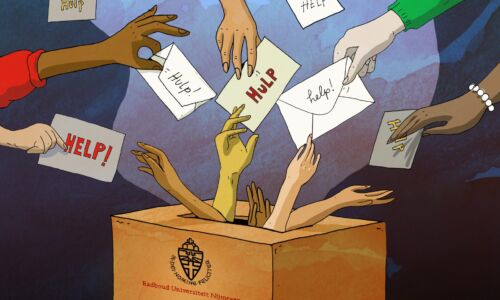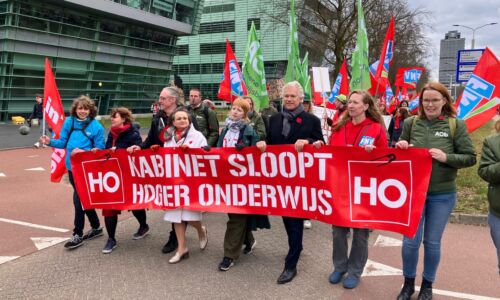‘Have no illusions’, they used to say to Janneke van der Loop. Now she’s an ecology professor
-
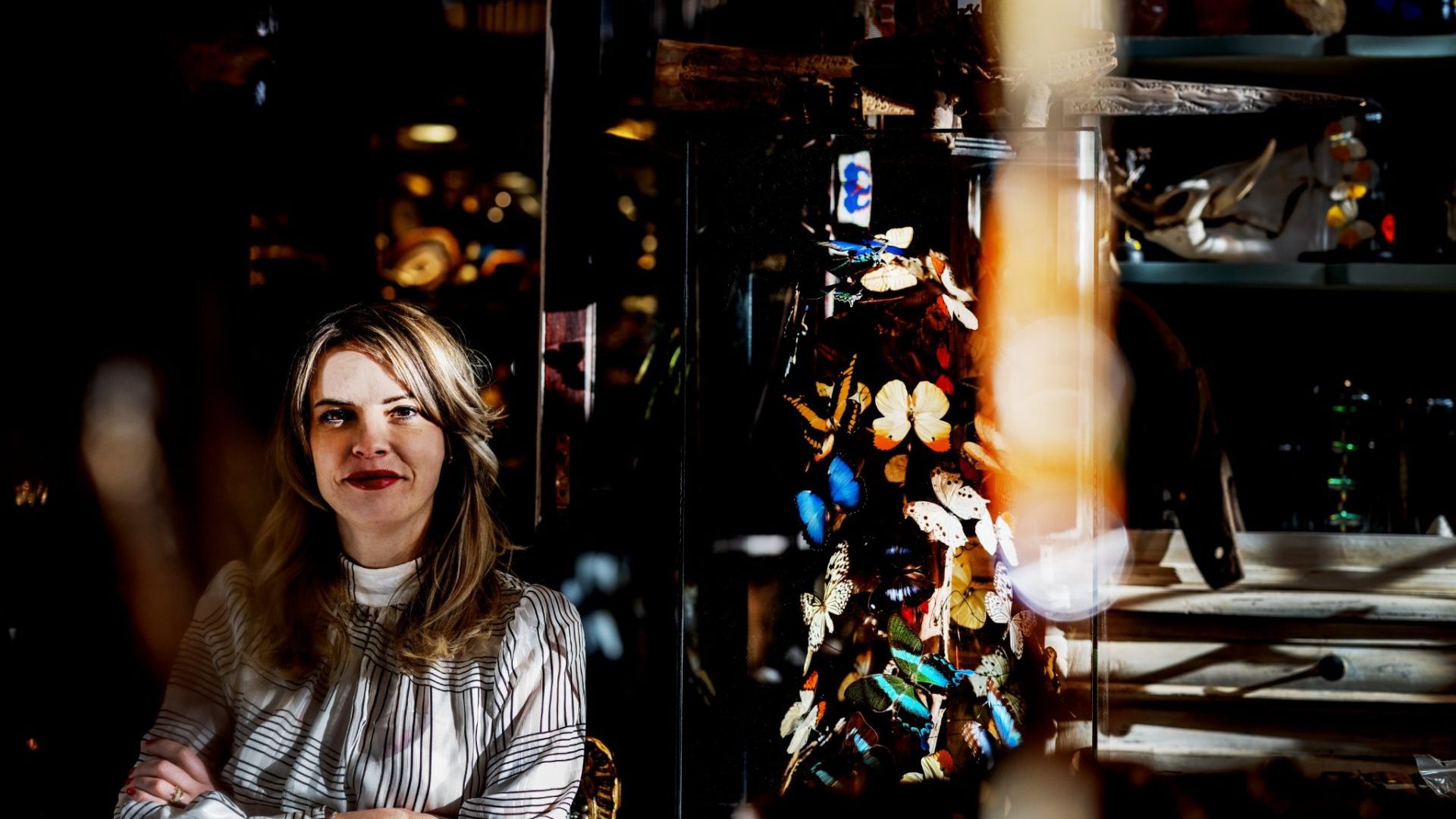 Janneke van der Loop. Foto: Duncan de Fey
Janneke van der Loop. Foto: Duncan de Fey
For five weeks, ecologist Janneke van der Loop was on television, in the VPOR show De laatste kans. The camera followed her around as she tried to rid Texel of pigmyweed. But the show was mainly about Van der Loop herself and her journey, from a troubled family life in Nijmegen’s Hatert quarter to a PhD candidate at the university. ‘Back home, they used to say: “don’t think you’re smart”.’
If people frequently tell you that you will not amount to much, there are two things you can do. One: Conform, and act like it. Or two: Do everything in your power to prove them wrong. Janneke van der Loop (37) chose the latter. After primary school, her teachers advised her to go to vmbo-b, vocational education, as she was not too bright and had better set a low bar. She refused; she aimed high, and eventually got her PhD in ecology at Radboud University.
Because she was so driven, VPRO came knocking on her door two years ago with a question. Did she want to participate in a show dedicated to people with one single chance to do something important? The producers were looking for a tenacious person working to preserve nature. ‘They called the national forestry service’, Van der Loop says. ‘And they told them: yes, we know someone like that. That was me.’
Tattoo
And that is how Van der Loop appeared on De Laatste Hoop this past winter. She was portrayed as passionate ecologist making one final attempt to free Texel from the clutches of the New Zealand pigmyweed; a friendly name that belies its destructive nature. ‘pigmyweed is an invasive species, choking the other life in the water’, according to Van der Loop.
‘Oof, that does not make me look friendly, I thought’
The series depicts how she, with a fast Nijmegen lilt to her voice, tries to convince governmental- and nature-focused organisations that the creek bed will need to be dug up in order to get rid of the plant. ‘I was followed around by cameras for two years. When I finally saw the show for myself, it was a little uncomfortable. ‘Oof, that does not make me look friendly, I thought. Of course, the parts where I’m the most abrasive are the ones they put in the show.’
That abrasiveness has a good reason: Van der Loop knows the plant, an Australian native, inside and out. And should she ever forget the plant’s inexorable nature, she need only look at her arm; there’s a little tattoo of a branch poking out from under her sleeve. She got it during her PhD track. ‘The plant does feel a little bit like my baby.’ A baby she would rather see dead.
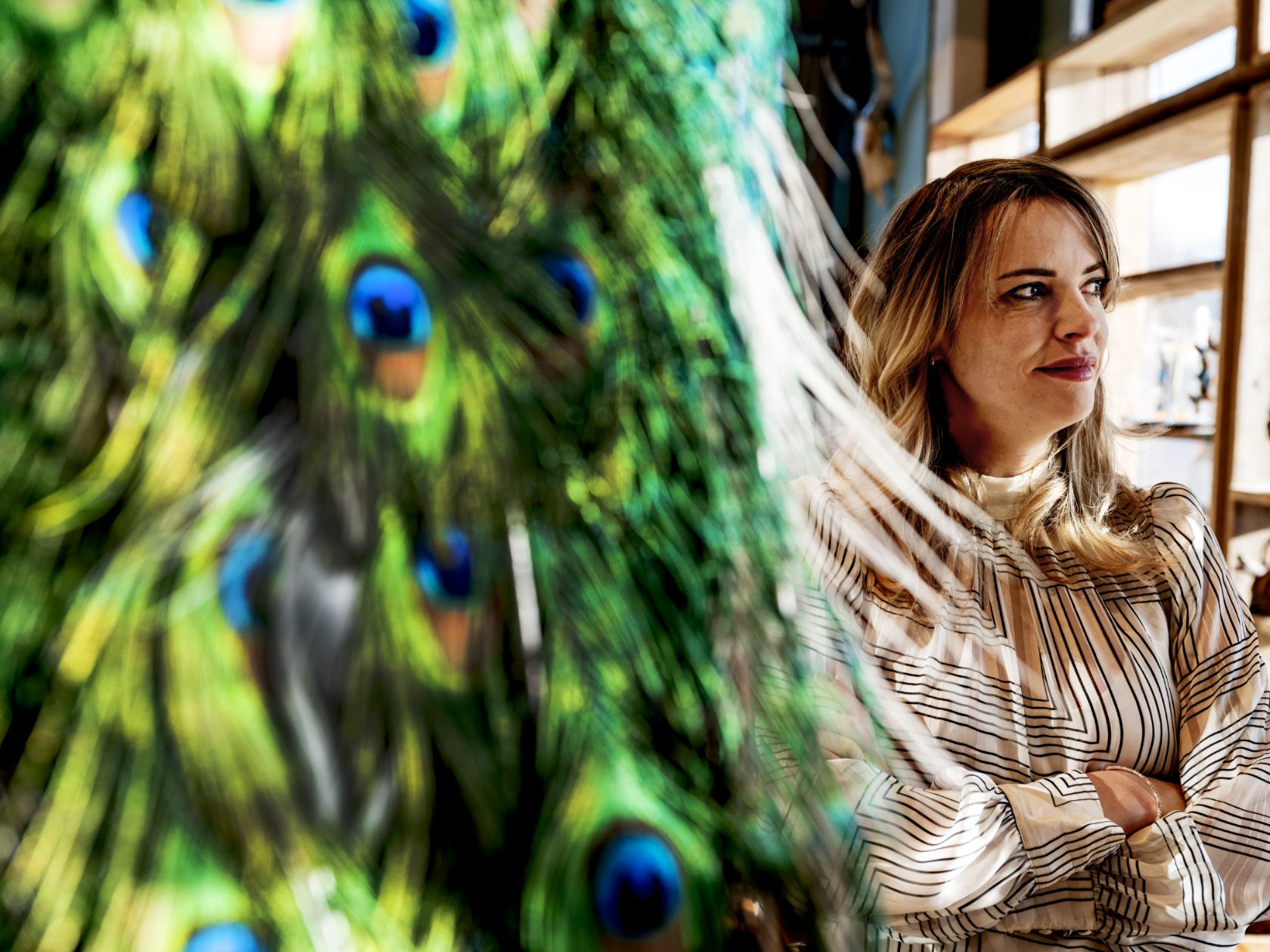
However, death is not necessarily a bad thing to Van der Loop. In addition to ecologist, she is also a taxidermist. That is why we agreed to meet in the Preparatenshop in Wageningen, where she restores animal mounts in her spare time. ‘Look at this anteater, for example. It’s over 140 years old.’ Van der Loop enthusiastically points to a creature with a lengthy snout and long, sleek hair. ‘The anteater actually has square hairs instead of round ones; feel it, it’s very odd.’ Older mounts tend to discolour from sunlight, which requires a new layer of paint. That is one of Van der Loop’s tasks.
But let’s go back to the pigmyweed. Or maybe Nijmegen’s Hatert quarter, where she grew up and got her schooling advice? Perhaps it’s better to start with Hatert, as that is where the seeds of her endurance were sown.
Little Opportunity
‘My parents were not really supportive’, Van der Loop says as we sit down amidst stuffed parrots, butterflies, and assorted skeletons. ‘Whenever I came home with a good report card, they would tell me: “don’t think you’re smart”.’ If her family were American, the term ‘white trash’ would not be amiss; Van der Loop can’t think of a proper Dutch synonym. ‘But that’s so you know what I mean.’ The home front tended to talk about ‘them foreign types’ in a way that Van Der Loon disagreed with even as a child. Not only that, but as a snot-nosed eight-year-old, she was the one to tell her mother that she shouldn’t smoke while pregnant.
‘I went looking for The Origin of Species’
Her parents were divorced, and uninvolved with her schooling. Because of her appearance (big mouth, shoddy appearance), teachers assumed that the little girl from Hatert would not have ample opportunities. One thing she did get from home was her love of animals and nature. ‘My mother had all sorts of pets running around. Dogs, cats, guinea pigs, rabbits, fish… Anything you could get at the pet store. And when I was fourteen, my dad told me why eggs have a shell, that chicks with a broken shell wouldn’t survive, that sort of thing. I thought that was really interesting. He said that Charles Darwin had figured all that stuff out, and that is why I went looking for The Origin of Species.
The iconic phrase I think, which Darwin wrote in one of his sketchbooks in 1937, is tattooed on Van der Loop’s arm, above the pigmyweed. Because The Origin of Species also turned out to be The Origin of Janneke, the biologist.
CSI Miami
Once she attended vmbo-b, Van der Loop quickly demonstrated that she was capable of much more. She was promoted to vmbo-t, the theoretical branch of vocational education. ‘That’s where I got a calculator for the first time’, she says. ‘And everything changed.’
Van der Loop could not do mental arithmetic, nor could she recite multiplication tables. Nowadays, this would be classified as dyscalculia. But when she was in primary school, it was just another reason for teachers to assume that she wouldn’t amount to much. But it turns out that, with a calculator, Van der Loop was capable of a lot more. ‘I understand how to do complex mathematical sums’, she explains. I know exactly how formulae work; I just can’t do it in my head, I still can’t.’
‘When I got a calculator, everything changed.’
Van der Loop breezed through her vmbo education and was then advised to make the transfer to havo. ‘But I did not want to do that; I’d made all sorts of fun friends.’ She got her diploma and signed up for the laboratory education in Arnhem – due to problems at home, Van der Loop moved out at a young age.
The show CSI Miami was really big in those days. I wanted to work in crime scene investigations, that seemed exciting; that is why I picked that education.’ However, the education proved to be tamer than expected. Van der Loop couldn’t see herself working in a lab for the rest of her life, so she attended follow-up courses at the HAN. Once done, she could call herself a biology teacher.
‘I taught for roughly a year. Then I thought: is this going to be every year from now on? That seemed boring, so I opted for a master’s course at the university.’
Promotion
Less than five kilometers from her birthplace, at the age of 26 she stepped onto the university campus where she would spend the next ten years of her life. As an intern, she was introduced to the Bargerveen Foundation, an organization conducting ecological research and providing advice aiming at nature restoration. Originally it is a spin-off from the university, there are several collaborations between the Bargerveen biologists in the Mercator Building and their Radboud colleagues in the Huygens. The organization asked whether Van der Loop wanted to be employed. And if she wanted to get promoted straight away?
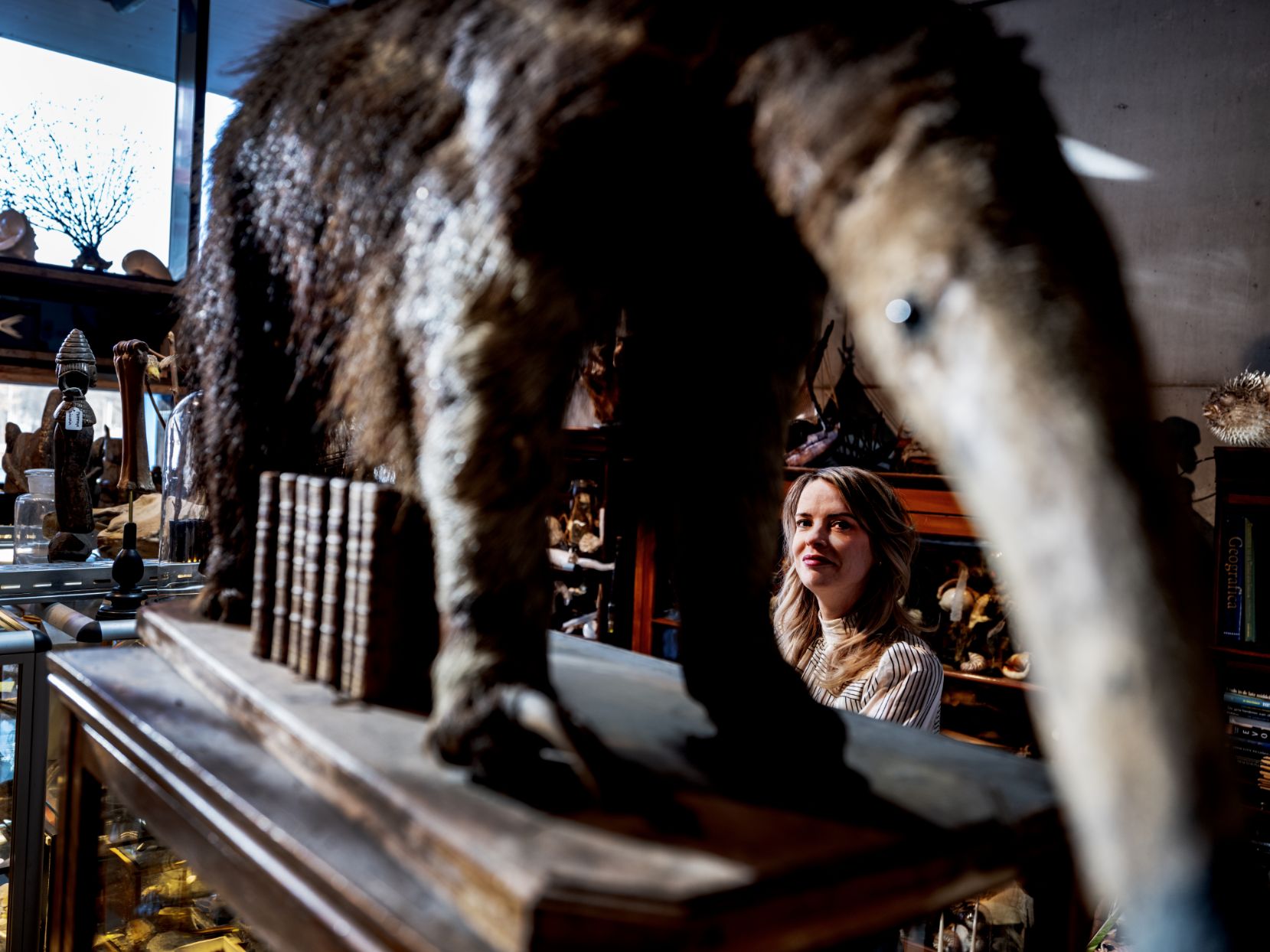
That is how the pigmyweed came into her life. The plant is a tormentor in the Netherlands, especially on the Wadden Islands. ‘The plant proliferates so much that at a certain point no more water is left in a nature reserve. Fish are thrashing on the surface, dragonflies can no longer reproduce and there is no need for newts to be there anymore.’
She gestures through the window to a vacant lot behind the Preparatenshop. ‘Nature then simply becomes just like this. At the moment, more insects are found on a piece of asphalt than on a place covered by the pigmyweed.’
On Vlieland – partly due to her involvement – we managed to completely eliminate the plant. But that didn’t happen without a fight. The only three options are: filling entire lakes of water, digging everything up or pouring a thick layer of shells on top of it. All are ugly and expensive. Additionally, you cannot simply arrive with a bulldozer in endangered, protected nature. Texel is still fighting the invasive species and on Terschelling the situation has almost reached to absolute zero. “But you must always remain alert,” says Van der Loop. “If there is a part of the plant under someone’s shoe, it can start growing again.”
Resistance
The pigmyweed is not only disastrous for biodiversity, it can also harm the tourism industry. Just think: a stunning dune area that is popular for its spoonbills immediately falls out of favor when there are no more birds in sight. Loss of income for the islanders is a result.
In the VPRO series, Van der Loop is followed during consultations with parties who certainly feel the urgency but are also resistant because of the drastic measures. The ecologist feels time pressure, because the plant happily continues to grow, every day that there is no action. But she doesn’t give up and eventually manages to get everyone on the same page and call in excavators to fill in a creek.
The plant happily continues to grow, every day that there is no action.
She said ‘yes’ to filming the TV series because she wants to bring nature’s fragility to the attention of a large audience. People need to understand what is at stake. On the day she received her PhD, in November 2022, the cameras were rolling in the Nijmegen Aula. The voice-over said that Van der Loop’s fight against the pigmyweed was also a battle with herself. It was not an easy path, given her youth. But now she stands here proudly.
“I was quite afraid of my parents’ reaction to the episodes,” she says, looking back. ‘They are both still alive and I tell quite a lot of private things. But I haven’t heard anything from them.’ She has not had contact with her mother for years and her contact with her father is very limited. It is unknown for her whether they watched or not.
Praxis
Did she ever feel the need to gloat in front of those teachers who used to tell her she was not very bright? Not really, she says. Because she can understand why they underestimated her at the time.
‘When I went to university, I had a job as a cashier at the Praxis. Sometimes I would meet the mothers of old school friends, who would ask me ‘Oh, you work here? My daughter’s in security.’ I always thought that was funny, but I didn’t correct them. If I had wound up as a full-time cashier at the Praxis, that does not mean I would have been less valuable or intelligent; you can’t pigeonhole someone based on their job. I think it’s nasty to look down on others.’
Right now, Van der Loop is researching other natural methods to stem the tide of the pigmyweed at the Bargerveen Foundation. One example is the use of native insects, like the larvae of the silver Y (a type of moth) or the pond snail (a freshwater snail), that feed on the plant. But because Van der Loop’s thirst for knowledge has not been slaked yet, she’s also learning Spanish and considering a course on art history.
‘I think it’s nasty to look down on others’
‘The animal mounts that I help to restore, are art-adjacent; it’s a field I would like to learn more about.’ Besides the Preparatenshop, Van der Loop does taxidermy work for an antiques dealer in the upper end of Amsterdam. Customers pay vast sums for a stuffed hornbill or leopard. Van der Loop simply enjoys fixing broken noses or replacing crumbled clay with a new base. The job relates to her profession as a biologist, in that she tries to preserve the beauty of nature for the future. ‘A well-made mount can last for 200 years.’
However, she emphasizes that taxidermy should remain a hobby. ‘It’s risky to turn a hobby, something you love, into a job; if it turns into something you have to do, that kills the fun. Now, I get to decide when I have time to do it, and that keep s int enjoyable.’
Looking back
De laatste kans can be watched through NPO Start. The VPRO show follows nine people whose lives revolve almost obsessively on one last chance, including that of Radboud biologist Janneke van der Loop. The series was made by the same team that earlier produced the award-winning documentary series Stuk, which was about people in rehabilitation centres.
